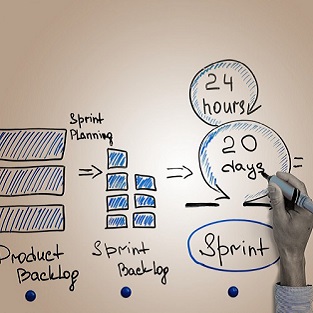How to get fast value from your IT project

If you want to get value out of your IT projects fast you might want to rethink your approach. Instead of looking at your IT project as a marathon, you can look at it as a series of short sprints that let you get to defined points really quickly.
For years people have used a methodology called “waterfall” to deliver “on time and on budget”. Steps are:
- You gather and document the user/business requirements
- You get the right technical resources to design a solution that meets the requirements
- You develop the solution
- You get users to test the solution (User Acceptance Testing – UAT)
- You roll it out into production
But “waterfall” has some problems – and here’s the top three:
First there’s the time it takes. If you need to get each step “right” before you move on to the next step then even a relatively small implementation can take months to deliver. You might deliver “on time” but that might still be too long before there’s any return on investment. In other words “time to value” isn’t there.
Second there’s the tendency for people to cram in too much in one IT project because they fear they might not have another shot at it once it’s delivered. So people gather too many user/business requirements in the first step. They add in more and more “nice to have” features. This all adds to the complexity and the cost, not to mention time.
Finally, “waterfall” doesn’t handle change well. This is a problem given how quickly business requirements can change, particularly once users understand the capabilities of the technology they’re using. Once an organisation has invested heavily into steps 1 and 2, making any change can be a nightmare. And this inability to handle change well often doesn’t become evident until User Acceptance Testing, at which point business and user requirements have often moved far beyond the initial conceptions.
So is there another way to deliver IT projects? There is. It’s called “Agile”. As its name implies it’s all about being nimble, flexible and fast moving
“Agile” is different because it is a very tightly targeted approach, with achievable goals:
- You identify the requirements that will deliver the most value
- You deliver to those requirements first
- You do that via a series of short, discrete development cycles called “Sprints”. Each Sprint is of a fixed duration, usually between 2 weeks to 2 months.
- You deliver a useable solution at the end of each Sprint.
- If there is more value to be delivered then you kick-off another Sprint. If the extra value isn’t significant enough you stop.
“Agile” is short, sharp, multifunction team based effort which we have been using to deliver functioning systems with significant business value in under a month.
“Agile” is designed to handle change very well. As such it is really well suited for solutions that need to respond to change – Client Relationship Management (CRM) and Business Intelligence (BI) solutions, for example.
There are two main reasons for this.
Agile takes a prototyping approach. It puts out a working model during a Sprint, so users get to interact with the solution as it is being developed. This means users get to understand what the solution can do for them. It allows them to generate new ideas on how to get value from the solution and optimise functionality.
As well, Agile is fast. Users don’t need to wait six months. And it’s not final. If something new comes up or priorities change then those changes can be incorporated in the next Sprint.
You don’t have to be stuck with long IT projects that take months to deliver value.
If you feel your projects are taking too long, not delivering value quickly enough or always seem to be out of synch with what you really need, you should give us a call.
Visit our website www.ecleva.com or if you have any query than don’t hesitate to Contact us.




cours de theatre paris
September 30, 2017 at 4:26 pmVery informative blog article.Much thanks again. Great.
Keisha
April 7, 2017 at 5:06 amThat’s a cunning answer to a chlinenglag question